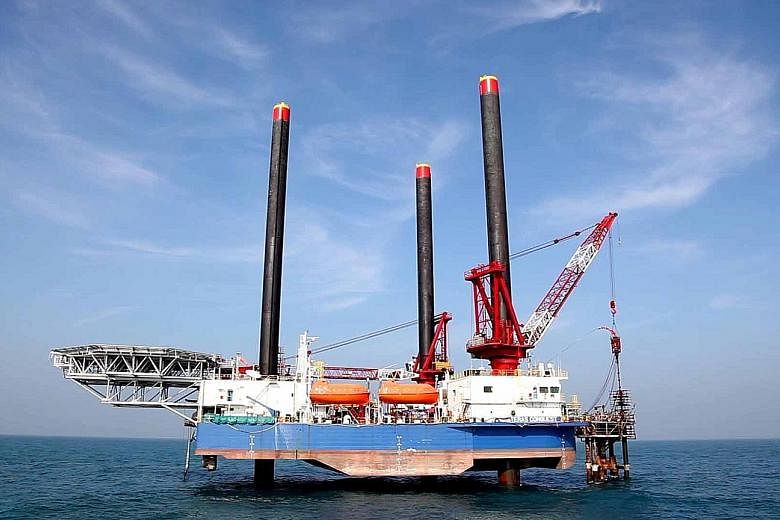Ezion Holdings wants holders of its bonds and perpetuals to stick it out for another six to 10 years before they get their $575 million paid back in full.
The cash-poor liftboat operator said it is in talks with lenders to bring down its debt, and has been promised a fresh line of up to US$100 million (S$136 million) from six banks to help fund the modification and deployment of vessels over the next 12 months. But the lenders - DBS Bank, United Overseas Bank, OCBC Bank, Maybank, CIMB, RHB and Caterpillar Finance - need to see bond holders bite the bullet too before talks can proceed.
Also waiting in the wings is a strategic investor - an industry-based conglomerate - that is keen to work with Ezion, but wants to see the refinancing completed first.
Ezion has a fleet of 14 liftboats, 20 rigs and 45 small vessels. At present, seven liftboats and nine rigs are deployed, but the contractors for six rigs are not paying.
According to an illustration of cash flows presented by financial adviser RSM, Ezion could make a net cash flow of US$933 million over the next six years, based on current charter rates.
Ezion chief executive Chew Thiam Keng told The Straits Times: "Our liftboats are all new. The oldest is about seven years old, and the average age is two years. God willing, we should have all deployed by the middle of next year."
RSM assumed an 80 to 85 per cent liftboat utilisation rate in its illustration. Liftboats are used to maintain and repair production platforms in shallow-water oil fields. Work is expected to pick up from next year since oil majors have cut capital expenditure, Mr Chew said.
As for the small vessels division, Ezion has warned of a substantial impairment. Rigs, tugs and barges will have to be scrapped or stacked.
"We were hoping the rates would recover this year but they did not. It's problematic," said Mr Chew.
Series 003 to Series 007 bond holders have two options. Option A is to defer their principal for seven years, and collect a small 0.25 per cent coupon per annum and 5 per cent redemption premium at the end of seven years. Option B shortens the wait to six years, and instead of a redemption premium, bond holders can swap their holdings for equity. If a bond holder opts to convert his entire principal into shares, he would take a 36 per cent haircut based on an initial conversion price of 30.8 cents. Ezion shares last traded at 19.7 cents.
For Series 008 perpetuities holders, Option C is similar to Option A except they have to wait 10 years instead of seven. Or they can choose Option D, where they continue to hold a perp but can also swap their holdings for equity.
Shareholders face dilution of up to 47.5 per cent from this proposal. Ezion's DBS-backed bonds are not part of the restructuring.
Mr Alexander Zeeh, chief executive of SEA Asset Management, which holds some of the 2018 bonds in the S.E.A. Asian High Yield Bond Fund, said: "The terms for the perp holders seem to be too generous compared with the senior debt holders'. Perp holders get the option to be repaid in 10 years, that's shorter than a perpetuity."
He believes the option to swap debt for equity could make more sense for investors: "Some people depend on interest income and have counted on that. To go to 0.25 per cent could be hardship and there may not be liquidity to sell their bonds. With Option B, they could partially liquefy their holdings and get their principal back in six years rather than seven."
He added: "I think there's a good chance they (Ezion) survive. We do expect repayment."
Ezion will use the next week to fine-tune the refinancing terms. It plans to launch a consent solicitation exercise by the middle of this month, where it needs a 75 per cent majority from bond holders. Shareholder approval will be sought at a later date. Mr Chew estimates that 70 per cent of bonds were sold to private banking clients.


